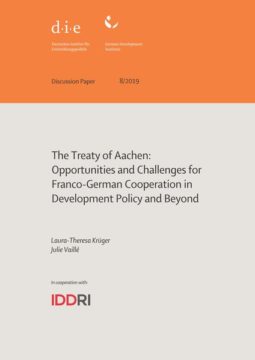On 22 January 2019, France and Germany signed the Treaty of Aachen, which – among other things – foresees a stronger coordination and cooperation in the field of development policy. Against the backdrop of the Agenda 2030, the need for collective action has rarely been higher. Yet, although formal agreements on Franco-German cooperation were initially made in the 1963 Élysée Treaty, preliminary research insights point to the fact that cooperation has so far been driven more by opportunity than by strategy. That is why this study seeks to analyse the main obstacles to Franco-German cooperation in global development and how these play out in practice. To this end, it provides an assessment of Franco-German cooperation in support of global sustainable development in general, as well as in two particular cases. These are the Sahel Alliance, founded on a French initiative and confirmed by France, Germany and the European Union in 2017 with a view to increasing coordination and effectiveness to the benefit of development and security in five Sahel countries; and a second initiative providing assistance to developing and emerging countries in conceiving and implementing their nationally determined contributions (NDCs), the NDC Partnership. The NDC Partnership was launched at the 22nd Conference of the Parties of the United Nations Framework Convention on Climate Change (COP22) in Marrakesh in 2016 on an initiative by Germany, Morocco and the World Resources Institute (WRI). Against this backdrop, the study formulates policy recommendations as to how Franco-German cooperation could be enhanced to the benefit of global development.
- Veröffentlicht am Freitag 19. Dezember 2025 von Deutsches Institut f. Entwicklungspolitik
- ISBN: 9783960210979
- 46 Seiten
- Genre: Gesellschaft, Politik, Sachbücher, Wirtschaft
